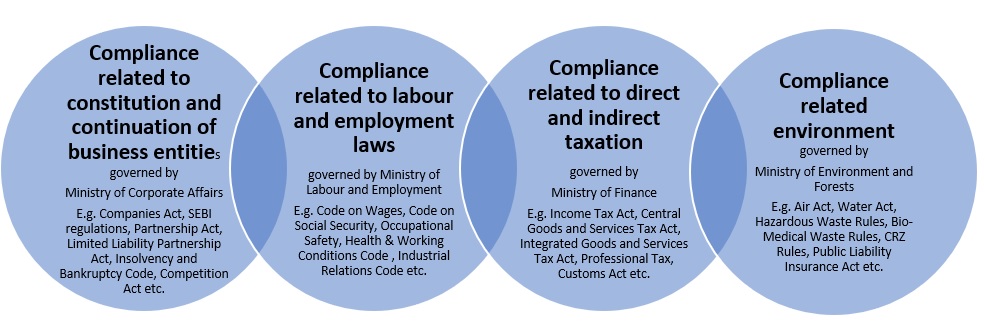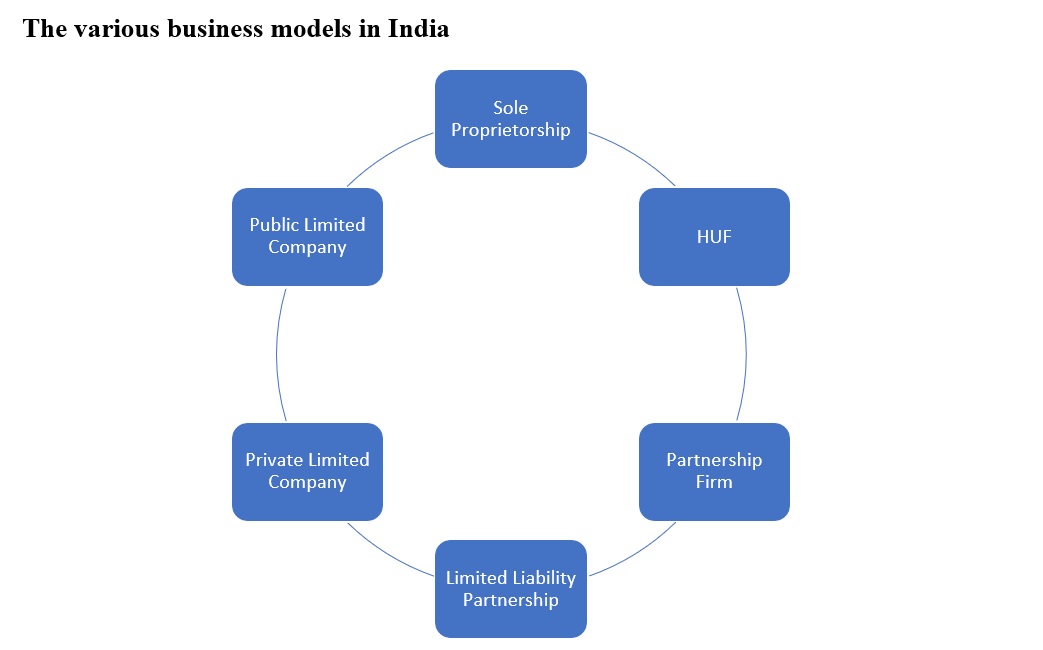Everything that you need to know about Start-up Compliance
Many of us aspire to start a business venture. In general, anyone who desires to have and run their own business, having a business plan in place, will have the next question about which business model should such a company adopt.
To encourage and empower the Start-ups in India, Government has launched several programs and ease of compliance to develop a conducive ecosystem for business ventures.
Some of the frequently asked questions are which business vehicle or the model shall I choose? What are the Statutory requirements to enable it? What are the benefits that I can yield?
Compliance is a multi-dimensional regulatory mechanism in which every business model has to traverse with appropriate governing authorities as per the provisions of laws.


To constitute and continue a business entity, the Ministry of Corporate Affairs (MCA) governs and regulates the compliance mechanism under the Companies Act, Limited Liability Partnership Act, Insolvency and Bankruptcy Code, Competition Act, Partnership Act, etc.
Every establishment, once constituted, have to abide by certain statutory compliance. The Ministry of Labour and Employment, under its exhaustive list of 44 labour laws, mandates the establishments and employers to comply with certain filing, remittance, and record retention regulations.
The Ministry of Finance governs the tax regulation and compliances for the Direct Tax and Indirect Tax Regime under the Central Laws such as Income Tax Act, Central Goods and Services Tax Act, Integrated Goods and Services Tax Act, Customs duties, and under State Laws such as the Property Tax, Professional Tax, Stamp Duty, Registration Fees, etc.
The Ministry of Environment and Forests governs the compliance related to the environment, pollution control, hazardous wastes, manufacture, storage, and import of hazardous chemicals under the Environment Protection Act, the Water (Prevention and Control of Pollution) Act, the Air (Prevention and Control of Pollution) Act, Hazardous Wastes (Management, Handling and Trans Boundary Movement) Rules, Indian Forest Act, Forest (Conservations) Act, National Environment Tribunal Act, Public Liability Insurance Act, etc.
The various business models in India
Sole Proprietorship Firm
This is an entity that is not governed by an exclusive and separate law. This is a business model where a single individual will handle the entire business and solely face both profits and losses.
The basic requirements to start a Sole Proprietorship are a designated Name of the Business / Proprietorship, a designated place of business, current account with a bank in the designated name of the business.
Joint Hindu Family business
This is an entity which is commonly called as 'HUF business model' i.e. the Hindu Undivided Family business which is owned only by the Hindu family members. This model is governed by the provisions of Hindu Law.
This business model should consist of Hindu Family (lineally descended from a common ancestor) more than one individual, having group of persons such as the wife, sons, daughters (Coparceners) led by the head of the family (Karta); The term Hindus includes Sikhs, Jains, Buddhists but not Christians and Muslims. And as stated above, the Hindu family should be living jointly by virtue of food and estate. There shall be a Corpus Fund / Capital Asset and the HUF Deed in stamp paper declaring the formation of HUF stating the details of the Karta, and Coparceners, source of the corpus fund, etc., with Permanent Account Number (PAN) for the HUF, a bank account in the name of HUF and Karta's photo, PAN, ID with Address proof.
Partnership
This is an entity governed by the provisions of the Indian Partnership Act, 1932. A Partnership Firm can be established when two or more people agree to join hands to form a business, divide the profits and losses arising out of such business in an agreed ratio. There can be a maximum of 10 partners in a firm with a banking business and a maximum of 20 partners in a firm with any other business.
The basic requirements suggested to start a Partnership Firm are a Designated Name for the Partnership Firm, with a bank account, a Partnership Deed (describing the details such as the name, address of the firm, partners, the nature of business, duration, the capital contribution by each partner, ratio of profit and loss as agreed amongst the partners, remuneration, rights, duties and obligations of each partner, operation of bank accounts, other general terms and conditions).
Registration, of the Firm, though not compulsory, is recommended to protect the partners' interests in the events of any disputes; Non-registration of a Firm disables the partners and firm's right to sue for disputes arising out of any contract.
A Firm can be registered at the time of constituting the Firm or subsequently, subject to the provisions of the Indian Partnership Act, 1932. An application for the registration of the Firm along with Certified Copy of the Partnership Deed, Proof of principal place of business, verifying affidavit from partners, the prescribed fee if any has to be submitted to the Registrar. Subject to the satisfactory scrutiny of the documents, the Registrar issues the Certificate. Any amendments, rectifications, in the Deed, cancellation of the Certificate due to dissolution of the Firm can be made in accordance with the provisions of the Act.
Limited Liability Partnership (LLP)
This is governed by the Limited Liability Partnership Act, 2008. To start this model, there shall be a minimum of two partners out of which one partner shall be Indian, and there is no upper limit prescribed under the Act on the maximum number of partners. LLP is a body corporate and has a separate legal entity like that of a Company; therefore, the LLP partners and the LLP itself are distinct from each other but it requires no minimum capital to start an LLP. The liability of each partner is as agreed upon the contribution.
To register the LLP, the Proof of registered address of LLP, the designated partners' PAN card / ID Proof, Address Proof, Photographs, their Digital Signature Certificate (DSC) and Director Identification Number (DIN) is necessary. If the partner is a foreign national, the passport copy is necessary. The LLP has to file a form of Limited Liability Partnership-Reserve Unique Name (LLP-RUN) to have a distinguished name amongst the already existing names, and it has to be approved by the Registrar. The LLP has to file the incorporation form along with the applicable fees. The LLP agreement must be executed in a stamp paper as per the respective State's applicable stamp. It has to be filed within thirty days from the date of incorporation online in the Ministry of Corporate Affairs (MCA) Portal.
Private Limited Company
This is the most widely opted business model and governed by the Companies Act. A private limited company has perpetual existence with a separate legal entity having its PAN, licenses, bank accounts, and the owner of such entity's liability is limited to its shareholdings. To constitute a private limited company, it requires a minimum of two members and a maximum of 200 members with a minimum of two directors and two shareholders, but to constitute a One Person Company (OPC), one member would suffice. This model can raise capital from various venture capital investors and funders.
To incorporate a private limited company, it requires the Memorandum of Association, Articles of Association, Director Identification Number of the Directors, name approval for the company, PAN, Tax deduction account number (TAN) and if any subscriber is a foreign national the passport copy and any address proof is necessary.
Registration of a private limited company is online through the MCA portal.
Public Limited Company
This model is governed by the Companies Act. This business entity can be incorporated by 7 or more persons and there is no maximum upper limit; however, it requires minimum one resident director (Indian). This model comprises the features of separate legal entity with perpetual succession. The shares are transferable without the consent of other shareholders. A public limited company require minimum authorized and subscribed share capital of Rupees Five Lakhs and can invite capital from the public and can be listed or unlisted.
To register a public limited company, it requires the approved company name, Memorandum of Association, Articles of Association, company's board resolution authorizing the director, photographs, Proof of registered office of the company, DSC, DIN, PAN and Identity proof of the Directors, in case of foreign nationals copy of Proof of nationality and passport notarized or apostilled as applicable, The Registrar of Companies (ROC) after examining the submitted documents if deems it fit, issues the Certificate of Incorporation and Registration Certification of Public Limited Company.
MSME Registration
Any entity which falls within the ambit of Micro, Small, Medium Enterprises, can register under 'Udyog Aadhaar' that is provided by the Government under the Micro, Small, Medium Enterprise Development Act, 2006 (MSMED) to avail the government schemes, subsidies etc. To know more about the registration, renewal and benefits of MSME Registration, click here.
Labour Law Compliance
Once a business entity is constituted in any of the above model, it has to register the entity under certain labour laws to avail certain benefits and to abide certain regulatory provisions prescribed under such laws by way of filing remittance, reports, retain registers and records etc.
The Ministry of Labour and Employment, for the ease of doing business, has facilitated an online Shram Suvidha Registration and License, with user manual to register under EPF Act, ESI Act, Common Registration for EPF & ESI, Contract Labour (Regulation and Abolition) Act (CLA), Interstate Migrant Workmen Act (ISMW), Building and Other Construction Workers Act, to obtain License under the CLA and ISMW.
The Shops and Establishment Act
This is a State Legislation and its purpose is to regulate the employment conditions of workers in shops and establishments which includes work hours, rest intervals, overtime, holidays, termination of service, etc.
According to this Act, 'Shop' means any premises where any trade or business is carried on or where services are rendered to customers, including the offices, storerooms, godowns or warehouses, whether in the same premises or otherwise, used in connection with such trade or business. However, it does not include a commercial establishment, or a shop attached to a factory where the persons employed in the shop fall within the scope of the Factories Act,1948.
And 'Commercial Establishment' means a commercial or trading or banking or insurance establishment, an establishment or administrative service in which persons employed are mainly engaged in office work, a hotel, restaurant, boarding or eating house, a cafe or any other refreshment house, a theatre or any other place of public amusement or entertainment and includes such establishments as the State Government may by notification declare to be a commercial establishment for the purposes of this Act.
Compliance
The registration of the shop or commercial establishment has to be made within 30 days from the date of commencement of business.
The employer of every establishment shall submit a statement in prescribed form stating the name of the employer and the manager if any, postal address of the establishment, name of the establishment if any and such other particulars along with the prescribed fees. Subject to the satisfaction of the regional Inspector, the shop or establishment will be registered, and a registration certificate will be issued, which has to be prominently displayed in the establishment. The registration certificate is valid for a period of 5 years, which has to be renewed 90 days before the date of expiry by paying the fee in a prescribed manner. Any changes in the details submitted or closure of the business has to be reported in prescribed manner to the regional Inspector.
Every employer shall, on demand, produce for inspection of an Inspector, all registers, records, and notices required to be kept under and for the purposes of this Act.
Maintenance of registers and records and display of notices.— Every employer shall maintain such registers and records and display on the premises of his establishment, such notices as may be prescribed. All such registers and records shall be kept on the premises of the establishment to which they relate.
For example, the Karnataka Shops and Commercial Establishments Rules, prescribes as given below:
- Form ‘A’ - Combined Application for Registration / Renewal / Any change
- Form 'B' - Register of Establishment (by Inspector)
- Form 'C - Registration Certificate of Establishments (by Inspector)
- Form' D' - Employer to notify any changes (within 15 days from such changes)
- Form 'E' - Notice by State Government
- Form 'F' - Leave with Wages Register (records to be retained for a period 3 years after the last entry in it
- Form 'H' - Leave with Wages Book (to be provided by employer to the employee)
- Form 'J' - Form of Certificate by registered Medical Practitioner to certify age of employer (if sought by Inspector)
- Form 'K' - Diary of Inspector
- Form 'P' - Notice specifying the day(s) of week on which persons employed shall be given a holiday
- Form 'Q' - Appointment Order issued by the Employer under section 6-A
- Form 'R' - Employer seeking exemption to engage women employees in night shift (IT/ ITES) (minimum threshold 5 women)
- Form 'S' - Exemption granted by the Regional Labour Commissioner for employer's application under Form 'R'
- Form 'T' - Combined Muster Roll-cum-Register of Wages
- Form 'U' - Combined Annual Return to be filed before concerned Inspector on or before 31 January of every year
Visit Book
Employer to record remarks of the visiting Inspector
Likewise, every State's Shops and Establishment Act and the Rules prescribed thereunder will provide the details of records to be maintained by the employer as well as the forms.
Employees' Provident Fund and Miscellaneous Provisions Act, 1952 (PF Act)
This is a Central legislation with the objective of social welfare of the employees. Any factory or establishment having 20 or more employees directly or through contract shall register under this Act and the wage limit to be covered under this Act is Rs. 15,000/- per month. The PF contribution is calculated on the basic wages and the dearness allowance and does not include the food allowance, house rent allowance, overtime allowance, bonus etc.
The employer has to register for PF within one month from the date of reaching 20 employees.
To know more about the compliance under the PF Act, click here.
Employees' State Insurance Act, 1948 (ESI Act)
This is a Central legislation with the purpose of providing social security to the employees and is applicable to all States in India except for Nagaland, Manipur, Sikkim, Arunachal Pradesh, and Mizoram. The Act is applicable to non-seasonal factories employing ten or more persons, and also extended to the shops and establishments, private medical and educational institutions employing 20 or more persons. The wage limit coverage under the Act is Rs. 21,000/- per month.
The employer has to register its employees for ESI within ten days from the date of appointment as per the ESIC's notification P-11/12Misc./SST Misuse/2019-Rev.II dated 13.01.2020.
To know more about the compliance under the ESI Act, click here.
The Workmen's / Employees' Compensation Act, 1923 (WCA):
This is another Central legislation to provide social security to workmen and employees for injury by accident. The Act is applicable to certain employees as prescribed under Schedule II of the Act.
To know more about the compliance under the WCA, click here.
The Payment of Gratuity Act, 1972 (PGA)
This Central legislation is to provide for a scheme of payment to employees engaged in factories, mines, oil fields, ports, plantations, railways, shops and establishments wherein 10 or more persons are employed.
As per Rule 3 of the Payment of Gratuity Rules, 1972, within 30 days of this rule becoming applicable to an establishment, a notice in Form 'A' shall be submitted by the employer to the controlling authority of area.
To know more about the compliance under the PGA, click here.
The Maternity Benefit Act, 1961(MBA)
This is a special piece meal legislation for women in certain establishments to provide them with benefits before and after childbirth. The Act is applicable to all establishments which include factories, plantations, mines etc., belonging to Government, to every establishment wherein persons are employed for exhibition of equestrian, acrobatic or other performances and to any shop or establishment in any State wherein 10 or more persons are employed or were employed in preceding 12 months. The women who cannot claim under ESI Act for the reason of her income being above Rs. 3,000/- per month can claim the benefits under this Act. This Act was further amended in 2017 (Maternity Benefit (Amendment) Act, 2017) enhancing the benefits and facilities to the women.
To know more about the compliance under the MBA, click here.
The Factories Act, 1948
This is a social legislation which has been enacted for occupational safety, health and welfare of workers at workplaces. The objective of the Act is to regulate the conditions of work in manufacturing establishments coming within the definition of the term 'factory' as used in the Act. The Act is applicable to all the factories including State, and Central Government, to the premises wherein 10 or more workers are employed with use of power and engaged in manufacturing activities, 20 or more workers are employed without the use of power and engaged in manufacturing activities, Less than 10 workers, if activity is notified by the State Government.
As per the model Factories Rules, 1948, the occupier of every factory shall submit Form '6' in triplicate to the chief Inspector within 30 days from the date of applicability of these rules to such factory premises for registration and grant of license.
The registration, renewal, amendment and closure procedures applicable to the factories are prescribed under the respective State Rules.
To know more about the compliance under the Factories Act, click here.
The Apprentices Act, 1961
This is an Act to provide for regulation and control of training of Apprentices and for matters connected therewith. The employer has to comply with certain regulations as prescribed under the Act.
The Building & Other Construction Workers (Regulation of Employment & Conditions of Service) Act, 1996 (BOCW)
This is an Act to regulate the employment and conditions of service of building and other construction workers and to provide for their safety, health and welfare measure and for other matter connected therewith or incidental thereto. The Act is applicable to every establishment which employs or had employed 10 or more building workers on any day of the preceding 12 months in any building or other construction work.
As prescribed under BOCW rules, every establishment, within 60 days of this Act becoming applicable to it, shall make an application to the registering officer for the registration.
To know more about the compliance under BOCW Act, click here.
The Contract Labour (Regulation & Abolition) Act, 1970 (CLA)
This Act regulates the employment of contract labour in certain establishments, provide for abolition of contract labour in certain circumstances, and for other connected matters. Central and State Rules are made to ensure effective administration and monitoring of the Act. Central and State rules are made to ensure effective administration and monitoring of the Act. This Act extends to the whole of India and applies to every establishment or every contractor who employs or employed 20 or more workers on any day of the preceding 12 months as contract labour registration is compulsory to employ contract labour.
Every establishment shall register within the prescribed timeline as mentioned in the respective State Rules, failing which the registration shall be allowed by the certifying authorities subject to its satisfaction on reasonable grounds for any delay in the registration.
To know more about the compliance under CLA, click here.
The Labour Laws (Exemption from Furnishing Returns and Maintaining Register by Certain Establishments) Act, 1988
This is an Act to simplify the procedure for furnishing returns and maintaining registers in relation to establishments employing a small number of persons under certain labour laws.
The Act permits small as well as very small establishments to furnish an annual return in Form I in lieu of many returns and maintain a few registers like Form II and Form III. However, issuing wage slips in the Form prescribed in the Minimum Wages(Central) Rules, 1950 is not exempted.
To know more about the compliance under this Act, click here.
The Sexual Harassment of Women at Workplace (Prevention, Prohibition and Redressal) Act, 2013 (POSH)
POSH is enacted to provide protection to women at their workplace against sexual harassment; prevention and redressal of complaints and for matters connected or incidental thereto. The Act lays down steps to the employers to ensure that women are protected against sexual harassment at all the workplaces, be it in public or private.
The Labour Welfare Fund Act (LWA)
Labour welfare refers to all the facilities for labourers to improve their working conditions, provide social security, and raise their standard of living. Several state legislatures have enacted an Act exclusively focusing on the welfare of the workers, known as the Labour Welfare Fund Act. We tell you all about it here!
Labour Welfare Fund is a fund contributed by Employer, Employee and in some states by the Government as well. Separate (State) Labour Welfare Fund Act and (State) Labour Welfare Fund Rule are framed for different states & Union Territories.
Professional Tax
Professional Tax is the tax levied by the State Government on the income from employment or profession. In the cases of employment, the employer shall deduct the tax from the salary and deposit the same to the State Government and the employer shall furnish a return to the tax department in the prescribed form in a specified time frame along with Proof of tax payment. The other individual professionals shall pay their respective tax directly to the Government as prescribed under the Professional tax rules.
The amount of professional tax deducted / payable by an employee /professional differs from State to State based on the slabs prescribed by respective States under corresponding Professions, Trades, Callings, And Employments Act & Rules.
The professional tax is levied only in certain States; there are some states and union territories wherein this tax is not levied.
To know more on the compliance for Professional Tax remittance and returns, click here.
Need for Statutory Compliance
Every business model is facing its inherent competition in the current scenario. The rapidly increasing intricacies in running the business successfully is a daily challenge to every employer. Amidst this crucial business ecosystem, non-compliance to the statutory demands will be grave and undesirable expenses.
greytHR comes in rescue to simplify the statutory compliance of your HR.
Keep visiting us for more updates.









